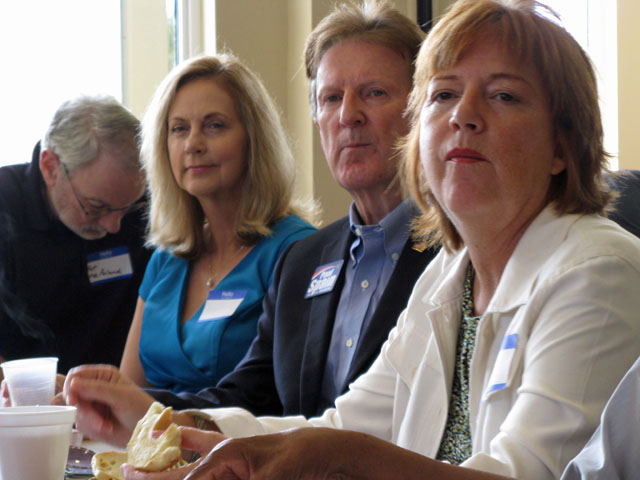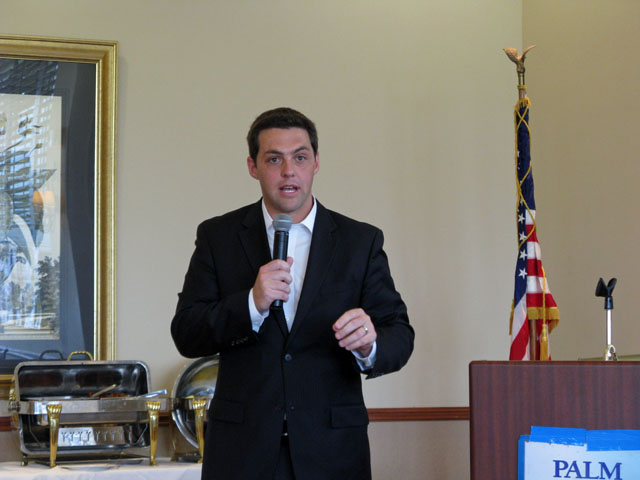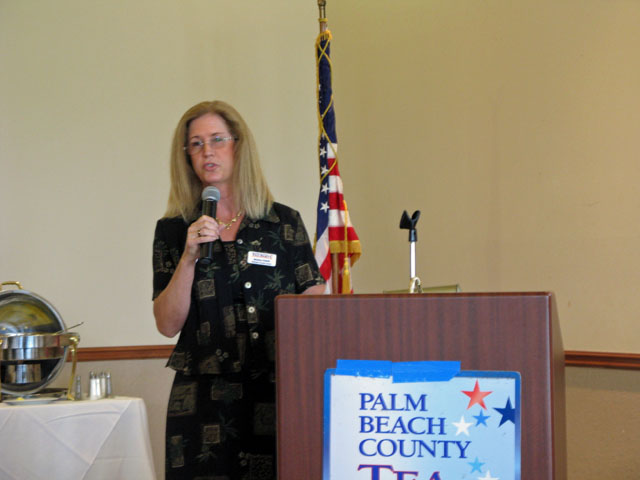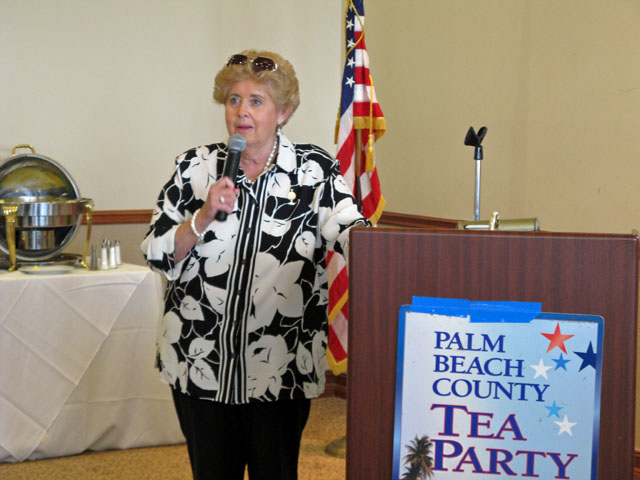Marsh, Golub and lots of candidates highlight Abacoa Meeting

On his third tea party appearance (see: Cade Marsh – the Face of Tomorrow’s Republican), Young Republican organizer Cade Marsh told us of the appeal of a “new conservative movement” to millennials who are not attracted to the conventional party structures. Involved in campus voter registration drives, he spoke of pressuring supervisors of election to place voting locations on college campuses and how students have the option of registering using their on-campus address.
Cade is a junior at Palm Beach Atlantic University in pre-Law and Business Administration and currently Executive Director of the Florida Federation of College Republicans. Check out Cade’s group at ffcr.org.
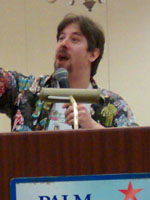
Political humorist Eric Golub, author of several satirical works including “Ideological Bigotry” “Ideological Idiocy” and others, calls himself “the younger version of Mort Sahl”. Offering advice on how to counter liberal disdain he offers these steps: Offer a compromise on gun control – take all the guns from the liberals and give them to us. Offer a compromise on abortion – develop a test for liberals while they are still in the womb. Trump may want to temporarily ban Muslims from immigrating, but Obama got 250K of them killed in Syria by ignoring his red line. Trump may want to block Mexican immigrants, but Obama got 200 of them killed with Fast & Furious.
Declining to reveal his choice for President he offered good words for the three frontrunners: Rubio has Reagan’s upbeat vision and is good with crowds. Depend on Cruz to do the right thing when a decision lands on his desk. Trump will deck Clinton like none of the others would.
Follow Eric on his blog, The Tygrrrr Express.
Next Tuesday’s elections brought Gardens Council candidates David Levy and Carl Woods to the event, and we heard from supporters of Ted Cruz and Donald Trump. Then looking ahead to the August 30 primary, Republican candidates for CD18 Carl Domino, Rick Roth, Brian Mast and Rebecca Negron made appearances, as did Independent Carla Spalding.
Cade Marsh – the Face of Tomorrow’s Republican
A past President of the PBAU Young Republicans who joined us in Wellington on Wednesday, Cade Marsh remembers when you could count the members on one hand, yet now there are several hundred. Now working on a state level, he is refining his techniques for recruiting the new conservative base.
Cade suggests that this next generation has a different view towards the news, often using social media to listen to those they trust rather than consuming mass media. This is all about “relationships” rather than “dictation”. With 1.1 million college students in Florida, and only 20% (by one estimate) who are registered to vote, there is a big opportunity here.
Asked what drives these newly politically actives, that is, what makes them angry enough to get involved, he pointed to the escalating size of the student loan burden. A solution (other than Bernie Sander’s concept of making the rich pay it off), involves new methods of education. Online learning for example, can deliver at much lower cost than the traditional classroom setting. Disruptive technologies are needed – think Uber.
Look for Cade at the Jupiter chapter in March.
Also at the meeting, we had volunteers from the Trump, Carson and Cruz campaigns boosting their guys, and we heard an update on the county plan to put a sales tax increase on the ballot this year – perhaps driving it up to 7.5%. The County Commission meets on it next Tuesday. For more information, see: Increasing Sales Tax a Bad Idea on the TAB website.
The Good, the Bad, and the Ugly with Dan Bongino
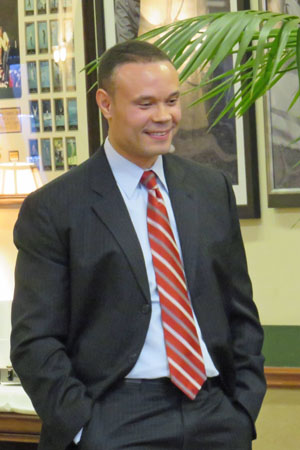
A good size crowd at Abacoa came to hear conservative pundit and former secret service agent Dan Bongino help summarize what Barack Obama has done to America.
Starting with a positive note – “The country will recover from Barack Obama”, he gave his perspective of the President – a smart man with a far-left agenda, surrounded by equal minded ideologues. From the executive orders on immigration, where the President repeatedly said he didn’t have the authority to act – then did just that, to the fanciful claims in the selling of Obamacare – “you can keep your doctor, etc. ..”, Dan described the country after the last seven years as living in a “post-constitutional society”. Our liberty is being taken away by “a man obsessed with power”.
In a clever characterization of the right-left divide, Dan points out that “we are all bound together by stories” (ie. narratives), but the left and right have different stories, which makes agreement or even dialogue very difficult.
Opening up the floor to questions, Dan went on for about a half hour, giving thoughtful, knowledgeable answers to a wide variety of questions, from 2030 and Agenda 21 (it is real – look it up), the control of local law enforcement by the DOJ, and why the Congress hasn’t moved to impeach Barack Obama (it would be unsuccessful, since 2/3 of the Senate would never vote to convict.)
Dan also had early copies of his book “The Fight, A Secret Service Agent’s Inside Account of Security Failings and the Political Machine”, available at Amazon for pre-order.
Candidates who were introduced at the meeting were Brian Mast and Paul Spain (CD18), and Christine Butler Spain, who is running for Supervisor of Elections.
We also had volunteers from three of Presidential campaigns, as Fred Scheibl, Marion Frank and Barry Carson laid out a rationale for Donald Trump, Ted Cruz and Ben Carson, respectively. A short “straw poll” by Mel yielded about 25 votes for Trump, 10-15 for Cruz, and about 5 for Carson, with a few mentions of the other 9 candidates.
Three Takeaways from the Sunshine Summit
The Sunshine Summit, last weekend’s gathering of the Republican grassroots in Orlando, brought together 14 of the 15 candidates currently competing for presidential primary votes, along with most of the Senate candidates.
Unlike the events of the last two cycles in 2007 and 2011, which featured both televised debates and straw polls, this was mostly a candidate showcase – each was given 20 minutes to make their case. The extreme number of candidates this time, and the fact that Florida does not vote until March 15 – after 26 states will have already assigned their delegates, probably reduced attendance at the event. Still, there were upwards of 1000 in the hall, and the media presence was considerable. CSPAN covered the event live, and lots of recognizable on-air personalities could be seen roaming the halls.
External events played a role in what transpired, as reaction to the Paris attacks on Friday were integrated into the Saturday speeches, or in the case of Chris Christie, dominated their remarks. And the Democrat debate on Saturday night offered a unique opportunity to compare all of our contenders to Hillary Clinton and her two pesky sparring partners.
All the candidates remarks can be seen streaming on CSPAN.
After watching all the debates and attending the Heritage Action Event in South Carolina (with 10 of the candidates), I thought I had a good idea of the dynamics of the race and who was on my short list. That said, I left Orlando with a few new insights.
1. The outsiders have captured the imagination of large portions of the Republican base, even at an event comprised mostly of “insiders”.
As an event sponsored by the Republican Party of Florida, with a large number of blue-badged party officials in attendance, I expected a great deal of support and enthusiasm for the “favorite sons” Jeb Bush and Marco Rubio, and less for the outsiders Trump, Carson, Fiorina, and (some would say) Ted Cruz. This was clearly not the case.
While Jeb and Marco have strong support, it was the outsiders who were the rock stars.
Ted Cruz laid out the red meat with a flourish and hit all the hot buttons from Obamacare to the border, the Iran deal, a flat tax, and support for Israel, to thunderous applause.
Donald Trump, avoiding any criticism of his rivals this time, took on illegal immigration (need a Dream Act for Americans), winning again, incompetent leaders, and suggested that college students should be taught about the first amendment. The response was widespread and overwhelming.
Ben Carson, after a quiet start discussing his upbringing, lit into an extensive litany of all the things he would do if he wanted to “destroy America” – all of which Obama has put into motion. His was the most complete and devastating attack on the incumbent President of all the candidates and the crowd responded with enthusiasm.
Carly Fiorina, the last speaker of the event, focused on the Paris attacks, the feckless and dangerous foreign policy of Obama/Clinton, and what she would be doing about ISIS. It seemed like Margaret Thatcher channeling Winston Churchill and left no doubt that she would be a serious and effective commander-in-chief. The response was loud and enthusiastic.
2. Almost all of the Republican contenders are displaying the vision, determination, skill and experience that could believably repair the damage that 7 years of Obama have wrought. Clinton is clearly not in the same league with these people, in spite of her over 25 years on the national stage, and tenure as Senator and Secretary of State.
One thing that has become obvious to many people is that there are many kinds of relevant experience besides being an elected official. The office of President is a unique job, unlike any other, and it takes a generalist to oversee a diverse set of tasks, a communicator to inspire the country and lead it in a positive direction, and a visionary to see our potential as a people and set the wheels in motion to carry us forward. Governors, Senators, Business Leaders – all have skills that are relevant to the job, and all of the candidates now in the race have been successful in their lives and bring serious qualifications and abilities to the table.
Some would say that the terrible state that the country is in – anemic growth, unsustainable debt, corruption at all levels, an abdication of world leadership – is a result of professional politicians and insiders (lobbyists, big donors, etc) having screwed everything up. Hillary Clinton, who is unarguably the stereotype of all those things, would represent more of the same, as could be seen on the debate stage in Des Moines. It was apparent in Orlando that our candidates (to a greater or lesser extent), reject the status quo and will lead the country in a different direction.
3. The weeding out process is going to be long and arduous, as very few of these contenders can be counted out, despite their current standing in the polls.
Until the first delegates are selected in the Iowa caucuses on February 1, the polls will be unreliable, as most likely voters appear to be making tentative selections. Many people, until they have to commit, will lean to the candidate that meets their ideological goals, appears to speak “for them”, says the “right things”, or wins debating points. When the rubber meets the road though, issues of electability, consistency, honesty, ethics, contrast with the Democrat candidate, and other issues will rise in importance. As this year is unusual in the number of candidates and the widespread dissatisfaction with elected officials, predictions are hard.
Some weeding out has already begun, as few would expect Lindsey Graham or Jim Gilmore to become the nominee, and two candidates have already left the race. But all the rest have ardent supporters and judging by the enthusiastic response at the summit to most of the candidates, there are many “acceptable alternatives”. It is truly a deep bench.
Immigration Gambit Proves Embarassing to County Mayor Vana
Palm Beach County is a Democrat stronghold. We all know that. With 43% of the registered voters (versus 28% for the Republicans), Democrats hold all of the county-wide offices except Property Appraiser, all of the Congressional seats, and about 70% of the county legislative delegation. In spite of those demographics, the County Commission does not usually behave in an overtly partisan way.
It was curious then, and unseemly, that Democrat County Mayor Shelley Vana, term limited on the commission but running for that lone Republican seat of Property Appraiser, would decide to propel the commissioners into one of the most divisive issues of all – illegal immigration and President Obama’s expansion of DACA and DAPA by (most would say) his illegal executive order.
The proposed resolution in support of the order, also asked Florida Attorney General Bondi to withdraw Florida from the 26 state lawsuit seeking to nullify the Obama overreach.
The 27 members of the public that spoke on the issue were mixed – 13 in favor of the resolution and 14 against. Those in favor seemed to be those who would seek to benefit from additional amnesty, as many had individual stories of coming to this country and having a hard time working, going to school, etc. Those against primarily focused on the rule of law and that we cannot ignore the laws that we do not like.
Many PBCTP members and friends turned out against the proposal, including Janet Campbell, Marion Frank, Pam Wohlschlegel, Lynn Scherer, Victoria Theil and Barry Carson, as well as CD18 candidate Paul Spain. Virginia Savietto, a Democrat candidate for House district 87 (which is 31% Hispanic) spoke in favor.
This highly divisive issue should never have been brought before the Commission, and Vana cited a county Hispanic Democrat group for requesting it. Republican Steven Abrams, highly critical of the county stirring up something for which it has no jurisdiction, moved to table the resolution indefinitely, which was seconded by the other Republican Hal Valeche. Three of the Democrats joined them in opposing the resolution including Priscilla Taylor (although she strongly supports President Obama), and Mary Lou Berger (who does support a path to citizenship for illegals). Mellisa Mckinlay voted against it but praised those from the immigrant community who came forth to speak for the record. Only Paulette Burdick and Mayor Vana voted for it. Mayor Vana did not like the “tone” of the debate. “What I saw here wasn’t very good,” she said.
Once again, the voices of the people made a measurable difference. Thanks to all who spoke at the meeting, called the commissioners, or sent email.
For Wayne Washington’s recap in the Palm beach Post, see: Immigration proposal begets raucous commission meeting
PBCTP Candidate Forum Highlights CD18 Candidates
The Florida primary election for all but the Presidential race is on August 30 – about 11 months from now. Even so, there are already 12 candidates (9 Republicans and 3 Democrats) that are competing for the CD18 seat currently held by Patrick Murphy. Six of them came together at Abacoa this week for a PBC Tea Party candidate forum hosted by channel 5’s Michael Williams.
With the good sized, occasionally boisterous crowd, and a series of policy oriented questions from the moderator which challenged their conservative bona fides, it was good practice for these candidates as they launch their campaigns, and practice is important. Two of the candidates – Carl Domino and Paul Spain, ran for Congress in the last cycle, and Carl has 8 years of experience as a state legislator. These came across as polished and extremely prepared for whatever was thrown at them. The relative inexperience of the others was clearly in evidence as they stumbled over straightforward questions, but they all have a rationale for their candidacy and are quick enough to learn from their mistakes. At this point in the cycle, any of the six could emerge as the likely nominee.
The questions covered a lot of topics, including if they would shut down the government over Planned Parenthood or the debt limit, their tax plans, what in the budget they would cut, the 2nd amendment, the conflict in Syria, and social issues such as the definition of marriage. Many of the answers were within expected parameters for a Republican primary, but there were some unique positions that stood out.
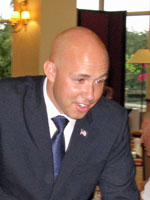
Brian Mast, the highly decorated Army veteran who is campaigning with energy and spirit and does not let his combat injuries hold him back, cast many answers from a military perspective, and listed fixing the VA as a top priority. He favors a “fair tax” (on consumption) of around 10% of GDP, would avoid shutting down the government over the budget or debt ceiling, and would favor means testing for Social Security and Medicare.
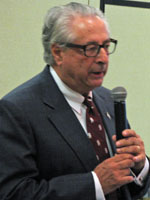
Carl Domino, the veteran Tallahassee lawmaker, would fight harder on the budget, casting a government shutdown as a political decision by the President in response to the Congress’ authority to set spending priorities. He favors a Congressional limit on regulations based on the level of financial burden imposed, a modified flat tax, school choice as a way of attracting Hispanic and minority voters, limiting benefits to Congressmen and introducing term limits.
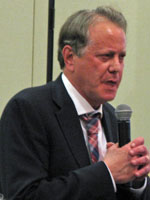
Marc Freeman, a Boca Raton doctor, would avoid a government shutdown as irresponsible. He would work to “simplify” Washington – pointing to Sarbanes-Oxley and Dodd-Frank as complicated rules that should be eliminated, and believes that “no able bodied person should be on the dole.”
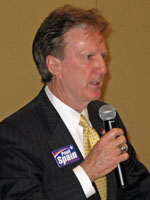
Paul Spain, who ran against Lois Frankel in CD22 last cycle, would never again raise the debt limit, believing the government doesn’t ever “really” shut down and there is plenty of revenue to pay the interest on the debt. Individual agencies should be frozen. His tax plan is similar to Donald Trump’s, with 3 rates and an exclusion below $30K. He was the only one to suggest (rightly) that Democrats favor open borders to increase their voting base.
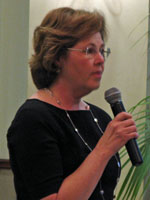
Rebecca Negron, Martin County school board member, would deal with the budget by not replacing government workers as they leave, and hopes to avoid “government by crisis” when spending bills are always up against a deadline. Her top priority is to kill the department of Education which brought us Common Core. Prior to sending troops to the middle east, she would want to see a plan (something current administration lacks).
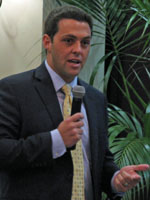
Rick Kozell, a Jupiter attorney with experience working for lawmakers in Washington, including Senators George LeMieux and Tom Coburn, opposes raising the debt limit and rejected the premise that raising the limit or shutting down the government were the only choices. He would work to roll back the regulatory state that is crushing small business and favors a flat tax. He opposes sending ground troops to the middle east “at this time”, and favors an immigration plan with guest workers but no citizenship path.
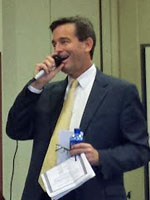
The moderator, Michael Williams, hosts the Sunday show on channel 5, “To the Point”. In my view, on his show he is pretty fair and balanced in the way candidates and issues from both sides of the political spectrum are treated. He was heckled by the audience at times during this event though, as some thought he was favoring some candidates over others in time allotment, and others rejected some of the premises of the questions. He did frame several questions with “the tea party believes…” – such as that we are all dependent on Medicare and Social Security and thus are hypocrites for calling for spending cuts. Of course that is something which comes natural to our liberal friends in the media and it did not really detract from the event. Most would admit that the “tea party” is not monolithic in thought, and generally driven by concern for the country as opposed to narrow self-interest.
Senate Candidate Ron DeSantis pumps up Abacoa
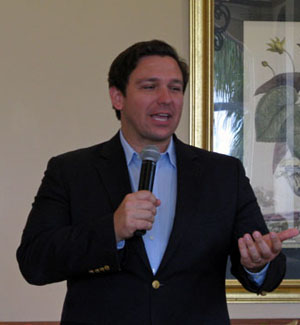
A Sunday brunch at Abacoa – not the typical time for a chapter meeting, but a good time to get to know Florida Senate candidate Ron DeSantis.
First elected to Congress in 2012, Ron represents Florida district 6, a coastal district stretching from south of Jacksonville to New Symrna Beach, and certainly has tea party roots. He was a frequent visitor to 912 and tea party groups throughout the state before his election, and visited us in Abacoa in February 2012. See: Ron DeSantis on the founding fathers’ views versus the administration’s
As a Congressman, Ron has been an active member of the Freedom Caucus led by Ohio’s Jim Jordan. This group of 40 or so Conservatives have been instrumental in pushing House leadership towards doing what they were elected to do, and it was caucus member Mark Meadows of North Carolina’s “motion to vacate the chair” that has led to Speaker Boehner’s resignation.
Now running for the Republican Senate nomination against Representative David Jolly and Lt. Governor Carlos Lopez-Cantero and others, if successful he will likely face either our own Patrick Murphy, or Orlando’s Alan “Die quickly” Grayson.
At the meeting, Ron was introduced by CD18 candidate Rick Kozell, who explained the importance of retaining this seat now held by Marco Rubio, and described Ron as someone who “walks the walk”.
Much of his remarks concerned the issues of today as they are seen in the House. The Iran deal for example, which was recognized as an Obama capitulation long before it came to a vote was a bad deal that opponents Murphy and Grayson both voted for – putting party unity over national security.
He talked about the size and power of government, which has made the counties around Washington DC the richest in the nation, and how it can corrupt even those who go there hoping to make a difference. All Congressman take an oath to “protect and defend the Constitution” he said, but when the President shreds that document and works to make Congress irrelevant, members of his party cheer.
In Ron’s view, the resignation of Speaker Boehner was not brought about by elected officials, but by the pressure of the 72% of Americans who dissapprove of the leadership in both the House and Senate. This has to change and his advice to the new Speaker would be to set measurable goals for the first 100 days to restore Congress as a co-equal branch of government. A good leader will put legislation on Obama’s desk and dare him to veto it – and rally public opinion against the President and his party if he does. Congress should use the tools at their disposal – the power of the purse for example, and pass no more continuing resolutions that just continue the policies put in place by Harry Reid.
Ron took a lot of questions from the audience, ranging from immigration to the Pope’s visit, how Congress works and ways to increase voter turnout (“let the people know that their vote will COUNT this time”.)
There are many days left before the 2016 election, but judging by the positive response from this crowd, Ron is off to a great start.
Some Pictures at the event:
Heritage Action Candidate Forum
Last week in Greenville, South Carolina, Heritage Action hosted a Presidential Candidate Forum at which 10 of the Republican candidates participated. Unlike the two cable news debates, this event avoided pitting the candidates against each other, and actually focused on policy.
This forum occurred during the annual meeting of the Heritage Action Sentinel program, which is the grass-roots arm of the Heritage Foundation. Combining the think-tank and lobbyist muscle of Heritage with a nation-wide grass-roots army of Sentinels is becoming a very effective way of advancing the Conservative agenda. If you would like to become a Sentinel or learn more about the program, visit: heritageaction.com/sentinel/
Stretching from 4:00 in the afternoon to after 9:00pm with only a short break, each candidate was given about 20 minutes on stage, with questions provided from a panel of Heritage Sentinels and CEO Michael Needham. South Carolina Governor Nikki Haley closed each session by providing a personal story about the candidate and asking them to expand on it. What came across was an in-depth look at their positions on issues, and a sampling of their human side – some that have not been seen before on the campaign trail.
From this unique format, a very good contrast can be found, and it is worth at least sampling the video from the candidates you are interested in. Links to those segments on the Heritage Action youtube channel can be found below.
Although all of the candidates were enthusiastically received by the audience of about 900 sentinels on the floor and over 10,000 more in the stands of Bon Secours Wellness Arena, two candidates really stood out.
Ted Cruz rallied the crowd with the theme of “don’t elect a President to manage the decline of America”, and was clearly the policy favorite with talk of judicial retention elections, a flat tax, and “breaking the cartel”. But it was Carly Fiorina, when asked by Governor Haley what her most difficult job as a leader has been, who spoke from the heart about the anguish that comes from having to fire a close associate who, although competent and a satisfactory performer, proved to be ethically challenged and could no longer be trusted. Her answer revealed a very admirable mix of courage, compassion and loyalty to the goals of the enterprise.
Following is a brief synopsis of the major points made by the candidates, in order of their appearance. Click on their picture to see the Heritage video of their segment.
 Jeb Bush
|
 Scott Walker
|
 Ben Carson
|
 Ted Cruz
|
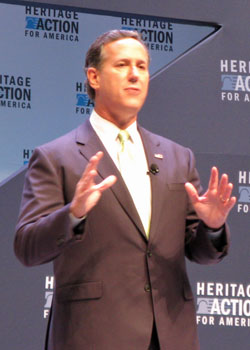 Rick Santorum
|
 Marco Rubio
|
 Rand Paul
|
 Carly Fiorina
|
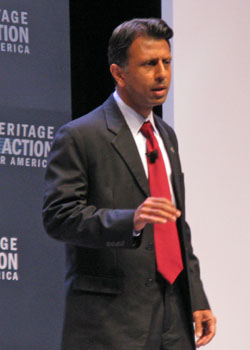 Bobby Jindal
|
 Chris Christie
|
Freedomworks 9/12 Summit Spotlights Freedom Caucus
Glenn Beck, who ended the 9/12 Freedomworks event in Orlando by announcing that Ted Cruz had won 41% in a straw poll of the thousands of attendees, at first joked that Donald Trump had won. (Trump actually came in third with 8%, and Ben Carson was second with 12%). The groans in the audience indicated that many prefer the steadfast conservatism of Cruz over the Trump phenomenon.
I mention this first, as it is indicative of the difficult year that is to come.
Glenn Beck also believes it will be a difficult year, even comparing it to 1968. In a reference to the Chicago riots of that year surrounding the Democratic convention, where the forces of Gene McCarthy battled it out with the Humphrey “establishment”, Beck suggested that the circus to surround the 2016 Philadelphia convention may “burn that city to the ground”.
Freedomworks was the key organizer of the 2009 “March on Washington”, in which many of us participated. With 1-2 million people in front of the Capitol (estimates vary), those were heady times filled with a combination of outrage over Obama’s actions and optimism that with enough of us working together, we could take our country back.
Today’s reality is different from what was imagined six years ago. A conservative uprising took back the House in 2010, along with many state legislatures and governors mansions, and then the Senate in 2014. But our presidential standard bearer Mitt Romney failed to take the fight to Obama in 2012 and little has actually changed. The Obama agenda marches on, with many victories and few defeats. There is a general feeling that the Republican leadership in both houses are either not up to the task of effective resistance, or worse, in thrall to the special interests that like the status quo just fine.
The conference highlighted members of the “Freedom Caucus” – a group of legislators who seek a change to the status quo. One of their members, Mark Meadows, is leading the fight to replace Speaker John Boehner. A number of other members spoke of the difficulty of the fight, of how they were ostracized by the insiders, losing key committee assignments and worse, as the Republican elites circled the wagon to protect their interests.
Currently, the Freedom Caucus consists of about 42 members – less than 10% of the 425 seats in the House of Representatives. Their mission is to give a voice to the countless Americans who feel that Washington does not represent them. Given recent polls, that group would be a large majority of the country. At the conference we heard from Caucus members Ted Yoho (FL3), Mark Meadows (NC11), Ron DeSantis (FL6), John Fleming (LA4), Tom Massey (KY4) and Tim Huelskamp (KS1). All are committed to finding a way to resist the Obama juggernaut, and the current focus of the fight is to replace John Boehner. Freedomworks CEO Adam Brandon thinks they may succeed and Boehner may not last out the year.
Currently there is no Freedom Caucus in the Senate, unless you count Ted Cruz and Mike Lee. Most will say that although Mitch McConnell has to go, there is no clear path to make that happen.
If there was a theme to this conference, it was that we should not lose hope, that there are legislators in Washington ready to fight the good fight on our behalf, and they deserve our support and protection. That support is the number one priority of Freedomworks, followed by fighting the regulatory state and promoting pro-growth economics.
The conference though, was originally promoted as a venue for the Presidential candidates. I suspect many signed up originally for this reason (at least I did). Yes, it is important to support the good work of the Freedom Caucus, but given the realities of the Congress and their inability to counter the President, it is the 2016 Presidential campaign that should be the primary focus of every conservative activist everywhere.
Which brings us back to Donald Trump, and why he is leading in the polls. On the one hand, Trump has not presented enough policy detail to determine if he is “conservative enough” to do the right things if he becomes President, and it is difficult to support him until his plan for the country becomes clear. What he does represent though is a “disruptive force” – a rolling cannonball who will go to Washington and roll over the kind of obstacles that tie the hands of even reform-minded leaders. Many pundits have concluded that Trump is leading in the polls because voters are rejecting “insiders”. Another explanation could be that they are rejecting those candidates who “talk the talk” but like so many who were sent to Congress in 2010 and 2012, do not have the courage or the ability to create the change that is needed.
To right the ship of state will take some well-placed disruptions that re-order the status quo. Trump seems like a candidate who could do that, being at the same time self-funded and untethered by conventional wisdom. If the other candidates, who we know to be true conservatives, would adopt the Trump world view that “creative destruction” can be applied to government as well as business, they would make themselves into much more electable candidates in the current political climate of anger and desperation.
Next weekend, Heritage Action will be hosting 12 of the presidential candidates at their grassroots event in Greenville, SC. I look forward to that meeting to see if there is a different message than Freedomworks presented, and will report on it next week.
Palm Beach County Tea Party leaders were volunteers at the Freedomworks event, including Mel and Barbara Grossman, Terry Gallagher and Marion Frank.
For Marion’s take on the event see: Freedomworks Event
Rebecca Negron on Common Core
The Common Core standards and the processes that they have created, have a wide impact on K-12 education, with policy implications at the local, state, and national levels.
Many see them as an onerous regimen imposed on local school districts by the federal government, loaded with progessive bias in content, and counter to the local control of education that our system has featured since the dawn of public education. Teachers don’t like the program because it has too much emphasis on testing, and whittles away at their autonomy in the classroom. Administrators oppose them for the high stakes they impose on scoring individual schools. Parents object to the way subjects are taught (which some find incomprehensible, particularly in basic mathematics), the critical importance given to test results, and the lack of local control over the classroom.
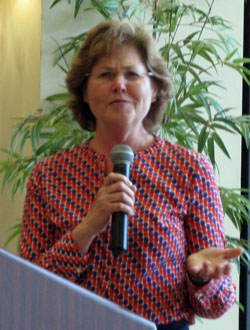
In spite of this opposition, the train has left the station and Common Core is being implemented to various degrees across the country. Our speaker, Rebecca Negron attempted to make sense of all this from the point of view of a Martin County School Board member who was drawn to the office when she did not like the way her own children were being taught.
So what is the current state of Common Core in Florida?
In her view, testing is out of control – the tests are too frequent, and because teachers pay and school rating depend so heavily on the results, the objective of learning is sometimes lost. Martin County this year has opted out of giving End of Year exams.
Teachers evaluations – an attempt to separate the excellent from the mediocre, have failed – after spending $1.3M on implementing an evaluation process for the county, almost all teachers fall in the top two categories – hardly the differentiator that was intended.
School choice (vouchers) – in her view a good, market driven program, has caused a circle the wagons mentality within the system, with the FSBA (Florida School Board Association) joining with the teachers union (FEA) in a lawsuit to end the Tax Credit Scholarship Program. Martin County has considered withdrawing from FSBA membership for this reason.
Mrs. Negron claimed that the problem is not the content of the Common Core Standards themselves, but the implementation, particularly in the “approved” textbooks that she describes as choosing the “best of the worst”. Change is hard though, and she has had little success in convincing her school board colleagues to seek new textbooks or push back against the state imposition of the standards and curriculum. The issues have moved up in the government food chain and local School Boards can do little given what is mandated at the state level, which in turn is influenced by the education dollars flowing from the federal government.
Quite a few questions led to a lively discussion at the end of the session, with many in the audience having been on the front lines of the common core fight. Identified by some as the villian of the piece, Jeb Bush and his “Excellence in Education” foundation have been a driving force for common core. It was pointed out that many in the legislature, including Rebecca’s husband Senator Joe Negron, have served on Bush’s board, making opposition in Tallahassee an uphill fight.
As many continued the discussion with Mrs. Negron after the session ended, it seemed clear that her assessment of the state of common core does not sit well, and there is much frustration that School Boards in Martin and Palm Beach County are not doing enough to push back against the common core juggernaut.

